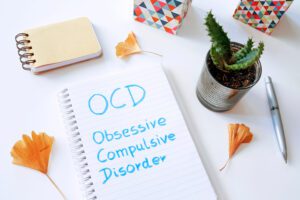
One of the most frustrating aspects of obsessive-compulsive disorder (OCD) is its periodic worsening. Just when someone gets certain obsessions or compulsions under control, they either return or new obsessions/compulsions pop up. OCD can sometimes feel like an endless game of whack-a-mole.
According to BrainsWay Chief Medical Officer, Aron Tendler, M.D., this is because OCD, like diabetes, is a chronic illness with constant daily implications and periodic worsening or relief.
Sometimes, OCD symptoms will simply get worse without any rhyme or reason. Yet, there are triggers that can contribute to the worsening of symptoms. It is helpful to know what these are in advance. They include:
Anxiety and OCD
OCD is an anxiety disorder. It causes unreasonable thoughts, fears, or worries (obsessions), which a person with OCD tries to manage through rituals (compulsions) to attempt to ease anxiety. When a person with OCD experiences increased anxiety, their OCD symptoms can worsen.
For example, a college student with OCD may feel an increase in anxiety about upcoming final exams. An OCD symptom that was mild a week ago — like checking to make sure their alarm clock is properly set — may become severe. Instead of checking the alarm a few times, the student may feel compelled to repeatedly check the alarm for more than hour before they are able to go to sleep.
Other times, the increased anxiety is more generalized and not in relation to a specific situation. In those instances, the anxiety can also worsen the OCD.
It is helpful for people with OCD to monitor their daily moods, so they can be watchful for periods of increased anxiety and try to be prepared for symptoms to potentially worsen.
Does Stress Make OCD Worse?
Similar to the college exam example above, stressful life events can also worsen OCD. A relationship breakup, job loss, and financial issues are all examples of events that can cause anxiety and trigger a worsening of OCD symptoms. Increased stress often exacerbates symptoms of OCD. Intrusive thoughts become stronger, making it harder to manage compulsions. Simple tasks like leaving the house become challenging due to the need for constant checking. Coping with OCD requires effective strategies, especially during high-stress periods. However, many individuals with OCD lack sufficient coping skills, leading to difficulties in daily functioning at home, work, and school.
Can Trauma Cause OCD to Worsen?
OCD can also worsen from traumatic events, such as death, severe injury, or sexual violence.
Illness
Most people are not at their best when they don’t feel well. Whether it is from a serious illness or a common cold, OCD symptoms can worsen when someone is sick. A more serious illness can also be a source of anxiety, exacerbating the OCD even more.
What to do when OCD Gets Worse
When OCD gets worse, there are several options to consider including medication, therapy, and Deep TMS.
Medication for OCD
Many OCD patients take medication to help manage their symptoms. There are currently five FDA-approved antidepressants for OCD. When OCD gets worse, some patients may benefit from a medication adjustment. That could mean a different antidepressant or the addition of another type of medication.
Therapy for OCD
Psychotherapy, including cognitive behavioral therapy (CBT) and exposure response therapy (ERP) can also be helpful to manage OCD symptoms.
CBT focuses on the thoughts, feelings, behaviors, and physical reactions linked to OCD, while helping patients become less anxious in reaction to them. One subtype, Acceptance and Commitment Therapy (ACT), assists patients in developing openness and flexibility when reacting to obsessive thoughts, while committing to behavioral change.
ERP gradually exposes the patient to the source of their anxiety, accompanied by the support of a mental health professional, who encourages them to refrain from acting on their compulsions. The OCD Foundation lists ERP as a top form of treatment.
Deep TMS™ for OCD
Unfortunately, 40% to 60% of patients fail to achieve a response from medication and therapy. For those patients, Deep Transcranial Magnetic Stimulation (Deep TMS™) should be considered.
Research has shown that hyperactivity in the cortico-striatal-thalamo-cortical (CSTC) pathway, a brain circuit that controls movement execution, habit formation and reward, is involved in OCD. Deep TMS, the first noninvasive device FDA-cleared to treat OCD, utilizes magnetic fields to stimulate the neural activity of the brain structures found to be related to OCD.
A multicenter study published in 2019 by the American Journal of Psychiatry confirmed the treatment’s efficacy, concluding that focusing brain stimulation on “the medial prefrontal cortex and anterior cingulate cortex significantly improved OCD symptoms.”
Deep TMS is also safe to combine with other forms of therapy and does not cause any systemic side effects. Deep TMS treatments can be easily incorporated into the patient’s daily schedule.
If you or someone you care about suffers from OCD, it is important to be aware of the triggers that can potentially worsen symptoms as well as possible treatment options. Talk to a healthcare provider to determine the best course of treatment for you.